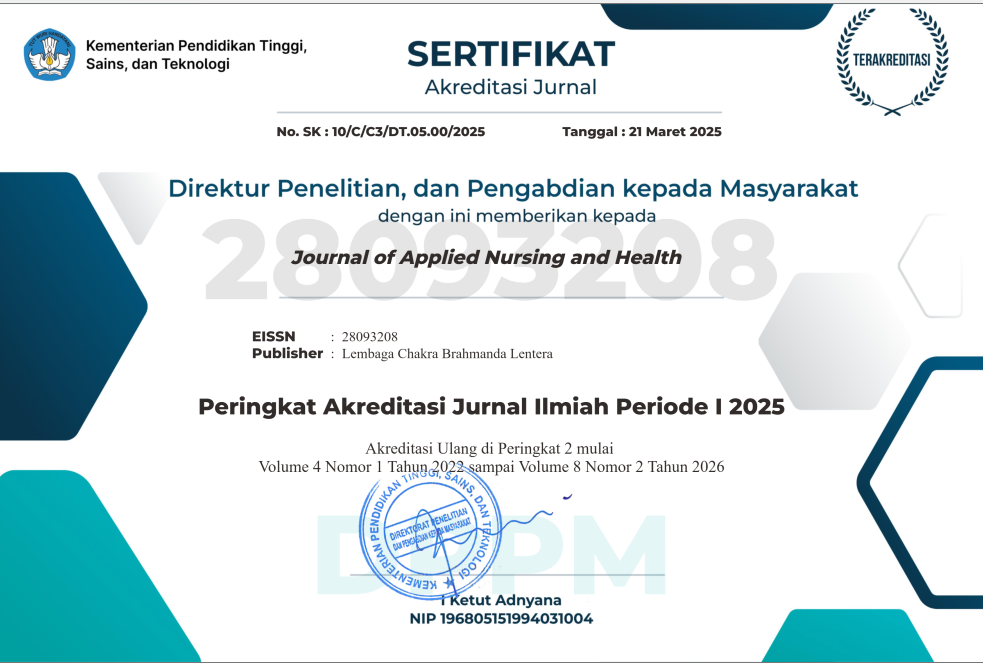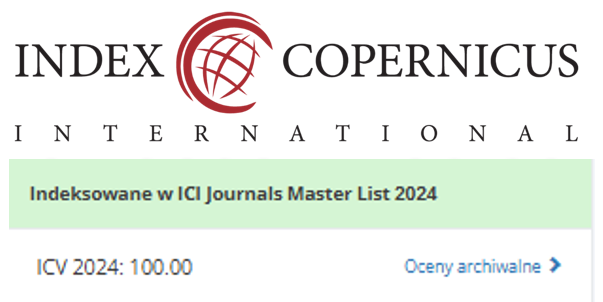Parents' Knowledge of Genetic Care and UTI Events in Toddlers in the Children's Ward
DOI:
https://doi.org/10.55018/janh.v4i2.56Keywords:
Knowledge, Urinary Tract Infections, ToddlersAbstract
Background: Infections of the urinary tract caused by bacterial invasion are known as urinary tract infections (UTI). The ability of parents to Genetalia’s care can be seen in how to clean Genetalia, cleaning during urinating or defecating, habits of disposable diaper changing, and habits of anal cleansing. This study aimed to investigate the correlation between the parents' ability to care for their children with the incidence of UTI in toddlers in the children's ward of Amelia Hospital Pare Kediri.
Methods: The design used in this study was cross-sectional. There were 81 respondents in the research of toddlers who fulfilled inclusion criteria. This was done using purposive sampling. The independent variables were the parents' ability to take care of their children and the dependent variables were the incidence of UTI in their children. Data was collected using respondent observations.
Results: The result showed that almost all respondents have a lack of parents' ability to care for their children (65.4%) and almost all toddlers have an incidence of urinary tract infection (63.3%). After analyzing the data with the cramers v contingency coefficient test and obtaining = 0.000, H1 was accepted and Ho was rejected, indicating that there was a relationship between family support and quality of life. r = 0 to 79.
Conclusion: In order to prevent the increasing incidence of UTI, it is recommended that hospitals increase the preventive efforts of ISK events in infants by providing counseling to parents using media such as leaflets, brochures, or video screenings.
Downloads
References
Axton, S., & Fugate, T. (2013). Rencana Asuhan Keperawatan Pediatrik. EGC.
Disler, R. T., White, H., Franklin, N., Armari, E., & Jackson, D. (2019). Reframing evidence-based practice curricula to facilitate engagement in nursing students. Nurse Education in Practice, 41, 102650. https://doi.org/https://doi.org/10.1016/j.nepr.2019.102650
Gerace, A., & Muir‐Cochrane, E. (2019). Perceptions of nurses working with psychiatric consumers regarding the elimination of seclusion and restraint in psychiatric inpatient settings and emergency departments: An Australian survey. International Journal of Mental Health Nursing, 28(1), 209–225.
Ji, A., & Levinson, D. (2020). A review of game theory models of lane changing. Transportmetrica A: Transport Science, 16(3), 1628–1647.
Kamboj, A. K., Hoversten, P., & Leggett, C. L. (2019). Upper Gastrointestinal Bleeding: Etiologies and Management. https://doi.org/10.1016/j.mayocp.2019.01.022
Kemenkes. (2017). Data dan Informasi Profil Kesehatan Indonesia 2016. Kemenkes RI.
Lenis, A. T., Lec, P. M., Chamie, K., & MSHS, M. D. (2020). Bladder Cancer: A Review. JAMA, 324(19), 1980–1991. https://doi.org/10.1001/jama.2020.17598
Mackey, A., & Bassendowski, S. (2017). The History of Evidence-Based Practice in Nursing Education and Practice. Journal of Professional Nursing, 33(1), 51–55. https://doi.org/https://doi.org/10.1016/j.profnurs.2016.05.009
Maknunah, L., Wahjudi, P., & Ramani, A. (2016). Faktor Risiko Kejadian Infeksi Saluran Kemih pada Anak di Poli Anak RSUD Blambangan Kabupaten Banyuwangi. In Artikel Ilmiah Hasil Penelitian Mahasiswa. Universitas Jember.
Nawakasari, N., & Nugraheni, A. Y. (2019). Evaluasi Penggunaan Antibiotik pada Pasien Infeksi Saluran Kemih di Instalasi Rawat Inap RSUP X di Klaten Tahun 2017. Jurnal Farmasi Indonesia, 16(1), 38–48.
Ngastiyah. (2012). Perawatan Anak Sakit. EGC.
Pardede, S., Tambunan, T., Alatas, H., Trihono, P. P., & Hidayati, E. L. (2012). Konsensus Infeksi Saluran Kemih pada Anak. Ikatan Dokter Anak Indonesia (IDAI) Unit Kerja Koordinasi (UKK) Nefrologi.
Prasetyoningsih, D. (2018). Studi Penggunaan Antibiotik Ciprofloxacin pada Pasien Infeksi Saluran Kemih. Universitas Muhammadiyah Malang.
Purba, A. A., Ardhani, P., Patria, S. Y., & Sadjimin, T. (2012). The Risk Factors of Urinary Tract Infection Among Elementary School Students in Sleman District,. Special Region. Journal of The Medical Science, 44(2).
Rosda. (2019). Knowledge And Interest Of Pregnant Mother Towards Pregnant Mother’s Implementation. Journal of Applied Nursing and Health, 1(2 SE-Articles), 48–52. https://janh.candle.or.id/index.php/janh/article/view/84
Sadri. (2014). Hubungan Personal Hygiene dan Peran Orang Tua terhadap Kejadian Keputihan (Flour Albus) pada Remaja Putri di SMA Negeri I Calang Kabupaten Aceh Jaya. Universitas Teuku Umar Meulaboh.
Sele, Y. (2019). Optimizing the potential of children learning in science (clis) with brain gym: review on human circulatory concepts. Biosfer: Jurnal Pendidikan Biologi, 12(2), 238–248.
Smeltzer, S. (2014). Textbook of Medical Surgical Nursing (8th ed.). Lippincott Williams.
Stein, R., Dogan, H. S., Hoebeke, P., Kocvara, R., Nijman, R. J. M., Radmayr, C., & Tekgul, S. (2015). Urinary Tract Infections in Children : EAU / ESPU Guidelines. European Urology, 67(1), 546–558. https://doi.org/https://doi.org/10.1016/j.eururo.2014.11.007
Sulisnadewi, N. L. K. (2013). Efektivitas Pendidikan Kesehatan Keluarga Terhadap Peningkatan Kemampuan Ibu Dalam Merawat Anak Diare 1. Jurnal Skala Husada, 10(1), 7–12.
Yarnell, C. J., Fu, L., Bonares, M. J., Nayfeh, A., & Fowler, R. A. (2020). Association between Chinese or South Asian ethnicity and end-of-life care in Ontario, Canada. CMAJ : Canadian Medical Association Journal = Journal de l’Association Medicale Canadienne, 192(11), E266–E274. https://doi.org/10.1503/cmaj.190655
Downloads
Published
How to Cite
Issue
Section
License

This work is licensed under a Creative Commons Attribution-ShareAlike 4.0 International License.


















